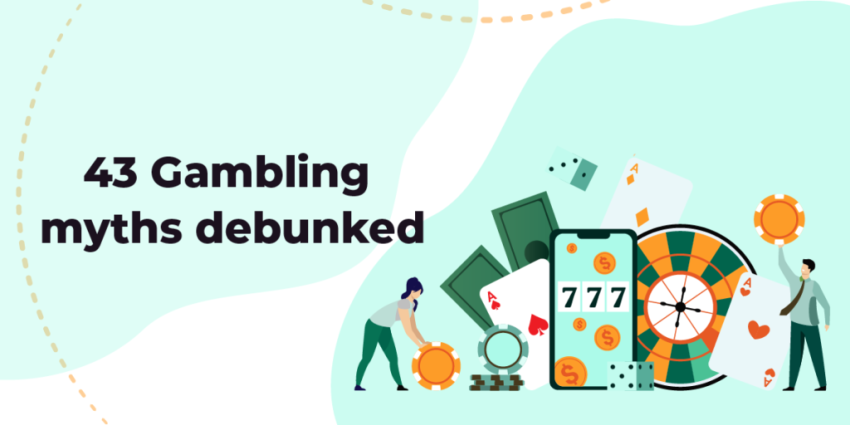Gambling myths have long plagued the industry, influencing the perceptions and behaviors of countless players. Many individuals fall prey to misconceptions, believing they can always beat the odds or that luck is the only factor determining their success. This guide seeks to unravel these gambling myths and provide insight into the truth about gambling, helping players distinguish fact from fiction. From the allure of online casino myths to sports betting myths, understanding these common fallacies is essential in making informed decisions. By debunking gambling myths and highlighting the factual realities, we aim to empower both novice and experienced gamblers in their journey.
The realm of wagering often encounters a host of inaccuracies, often referred to as gambling misconceptions, that can significantly mislead enthusiasts. These false narratives, whether about the mechanics of betting or the odds of winning, can create unrealistic expectations and result in poor financial decisions. In this informative discussion, we will explore these prevalent falsehoods and clarify the factual foundations that underpin the gambling experience. Through a careful examination of gambling’s intricacies, from understanding the role of chance to recognizing the importance of strategy, players can better navigate this exciting yet complex world. Shedding light on these misunderstandings is crucial for fostering a culture of responsible gaming.
Understanding Gambling Myths: Separating Fact from Fiction
Gambling myths are often rooted in cultural narratives and perpetuated by anecdotal evidence that overshadow the truth about gambling practices. One prevalent myth is that players can easily manipulate odds in their favor through specific betting strategies or techniques. Such misconceptions can lead to misguided behaviors, encouraging individuals to employ flawed concepts rather than relying on solid data and proven strategies. The reality is that the house always maintains an edge, and no strategy can alter the fundamental odds of a game.
Additionally, many gamblers fall into the trap of believing in the gambler’s fallacy—the notion that past outcomes influence future results in random games. For instance, players may believe that because a particular number hasn’t come up in roulette for several spins, it’s ‘due’ to win. This misconception can lead to increased betting on perceived ‘winning’ choices, often resulting in significant losses. To truly enjoy gambling, players must confront these gambling misconceptions, adopt a rational mindset focused on the odds, and embrace the truth about gambling rather than be swayed by myth.
Debunking Online Casino Myths: What Every Player Should Know
Online casinos have garnered a reputation filled with myths and misconceptions, some of which can deter potential players from engaging in this modern form of entertainment. A common belief is that online platforms are less trustworthy than traditional casinos, often viewed as rigged or unfair. However, reputable online casinos are governed by strict regulatory bodies and utilize random number generators (RNG) to maintain fairness and integrity in gameplay. Understanding these elements can help players feel more secure about their choices and enhance their overall gaming experience.
Moreover, it is often thought that online casinos offer lower payout rates compared to their brick-and-mortar counterparts, leading players to assume they are at a disadvantage when gambling online. In truth, many online casinos boast competitive payout percentages and often provide greater convenience and variety of games. By dispelling these online casino myths, players can approach this form of gambling with a clearer understanding of its benefits and potential risks, thereby making informed decisions that foster both enjoyment and responsible play.
Frequently Asked Questions
What are some common gambling myths that need debunking?
Common gambling myths include the misconceptions that gambling is a surefire way to become wealthy, and that online casinos are rigged. Many believe that they can consistently beat the odds, leading to poor financial decisions. Understanding the truth about gambling is essential; it’s primarily a form of entertainment rather than a reliable source of income.
How do online casino myths affect players’ experiences?
Online casino myths, such as the belief that they offer lower payouts than traditional casinos, can mislead players and cause unnecessary skepticism. In reality, reputable online casinos operate under strict regulations and often provide comparable or better payout percentages. Debunking these gambling myths is important for making informed choices and enhancing the overall gaming experience.
| Gambling Myths | Facts | Implications |
|---|---|---|
| Gambling guarantees instant wealth | Most gamblers lose money over time; gambling should be seen as entertainment. | Misleading myths may lead to financial irresponsibility. |
| Online casinos are rigged or pay less than traditional casinos | Reputable online casinos are regulated and use RNGs for fair play; payouts are often equal to or better than traditional casinos. | Unchecked skepticism can keep players from exploring legitimate online options. |
| High rollers get better odds and RTP rates | RTP rates do not change based on bet sizes; perks may exist, but odds remain consistent. | Misleading beliefs may prompt high-stakes players to wager irrationally. |
| Certain betting strategies in sports are always superior | Successful betting requires thorough research, understanding statistics, and not simplistic patterns. | Reliance on flawed strategies could lead to poor betting choices. |
| Gambler’s fallacy influences outcomes | Cognitive biases can create a false sense of control leading to reckless gambling. | Understanding psychological traps is crucial for responsible gambling. |
Summary
Gambling myths can often obscure the truth and lead players into harmful behaviors. These myths, from the misconception that gambling is a guaranteed path to wealth to assumptions about online casinos being rigged, create a misleading narrative that can affect both novice and seasoned players. By addressing these pervasive myths and focusing on factual information, individuals can approach gambling with a clearer perspective and greater responsibility. Ultimately, acknowledging the realities of gambling—such as the odds favoring the house, the fairness of regulated online casinos, and the importance of understanding statistical evidence in sports betting—empowers players to enjoy the experience without falling prey to the dangers of misinformation.
